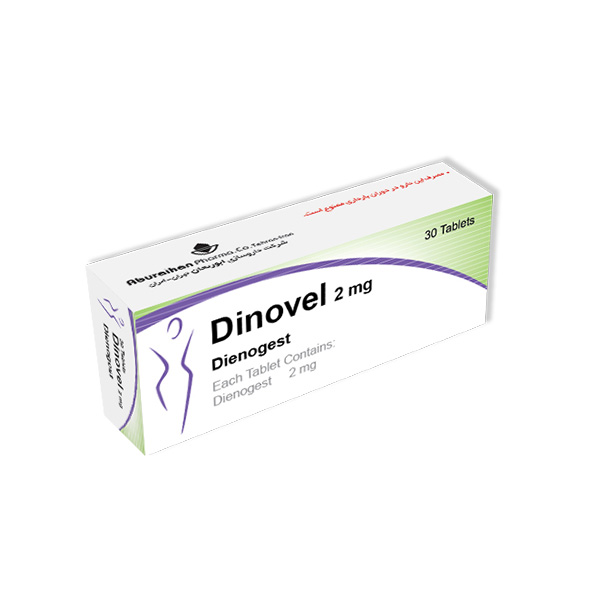Dinovel®
Dienogest
2mg Tablet
Management of pelvic pain associated with endometriosis.
Mechanism of Action:
Potent fourth-generation progestin
Method of Administration:
2 mg once daily; has been studied for up to 16 months of therapy.
Notes
Contraindications:
Dinovel® should not be used in women with any of the conditions listed below, which are partially derived from information on other progestin-only preparations. Should any of the conditions appear during the use of Dinovel®, treatment must be discontinued immediately: Known or suspected pregnancy, Lactation, Active venous thromboembolic disorder, Arterial and cardiovascular disease, past or present (eg, myocardial infarction, cerebrovascular accident, ischemic heart disease), Diabetes mellitus with vascular involvement.
Interactions:
Substances increasing the clearance of sex hormones (diminished efficacy by enzyme induction):
Substances increasing the clearance of sex hormones include phenytoin, barbiturates, primidone,
carbamazepine, rifampicin, and possibly also oxcarbazepine, topiramate, felbamate, griseofulvin
and products containing St. John’s wort
Enzyme induction can be observed after a few days of treatment. Maximum enzyme induction is generally seen within a few weeks. After the cessation of drug therapy, enzyme induction may be sustained for about 4 weeks.
Substances with variable effects on the clearance of sex hormones:
When co-administered with sex hormones, many HIV/HCV protease inhibitors and nonnucleoside reverse transcriptase inhibitors can increase or decrease plasma concentrations of the progestin. These changes may be clinically relevant in some cases.
Substances decreasing the clearance of sex hormones (enzyme inhibitors):
Dienogest is a substrate of cytochrome P450 (CYP) 3A4. Strong and moderate CYP3A4 inhibitors such as azole antifungals (eg, ketoconazole, itraconazole, voriconazole, fluconazole), verapamil, macrolides (eg, clarithromycin, erythromycin), diltiazem and grapefruit juice can increase plasma concentrations of the progestin.
Pregnancy and Lactation:
Administration of dienogest is contraindicated during pregnancy and lactation.
Warning and Precaution:
Bleeding: Use is associated with irregular menstrual bleeding and may be aggravated in some women (eg, those with fibroids). Bleeding patterns generally show a reduced intensity over time. If bleeding irregularities continue with prolonged use, appropriate diagnostic measures should be taken to rule out endometrial pathology (eg, endometrial sampling, pelvic ultrasound). Consider discontinuation of therapy with prolonged heavy bleeding. Pretreatment menstrual bleeding patterns return within 2 months of therapy discontinuation.
Bone mineral density loss: Dienogest has been associated with plateauing and loss of bone mineral density (BMD) which may not be completely reversible; BMD loss may be greater with prolonged use of dienogest. Risk assessment should also be performed in women of any age at increased risk of osteoporosis; adequate calcium and vitamin D intake should be encouraged in females of all ages.
Breast cancer: Use is contraindicated with known or suspected sex-hormone-dependent malignancy.
Carbohydrate intolerance: May impair glucose tolerance; use caution in women with diabetes or a history of gestational diabetes mellitus.
Chloasma: May occur occasionally; women with a history of chloasma should avoid sun or ultraviolet radiation exposure during therapy.
Cholestatic jaundice: Patients with a prior history of cholestatic jaundice during pregnancy or due to the use of sex steroids should discontinue use of dienogest if cholestatic jaundice reoccurs during therapy.
Hepatic tumors: Rare cases of benign and malignant hepatic tumors have been reported with use.
Ovarian cysts: Persistent ovarian cysts which are often asymptomatic may occur during therapy.
Pruritus: Patients with a prior history of pruritus during pregnancy or due to use of sex steroids should discontinue dienogest therapy if pruritus reoccurs during therapy.
Venous thromboembolism (VTE): Progestin-only therapy has been associated with a slight but non-significant increase risk of VTE in some studies; discontinue therapy promptly with suspicion or symptoms of a thrombotic event. Discontinue use in patients with prolonged immobilization and at least 4 weeks prior to elective surgery; may resume therapy 2 weeks after complete remobilization.
Cardiovascular disease: Use with caution in patients with multiple risk factors for cardiovascular disease (eg, hypertension, hypercholesterolemia, morbid obesity, diabetes, women who smoke); use of progestin only preparations may increase the risk of cardiovascular disease. Use is contraindicated in women with a history of or current arterial and cardiovascular disease. Discontinue if clinically significant hypertension develops during therapy.
Depression: Use with caution in patients with depression; discontinue use with onset of clinically relevant depression or with aggravation of pre-existing depression.
Adverse Reactions:
The most frequent (> 5%) adverse drug reactions: headache (6.6%) and breast discomfort including breast engorgement and breast pain (5.3%).
Storage:
Store below 30 and protect from light and moisture.

